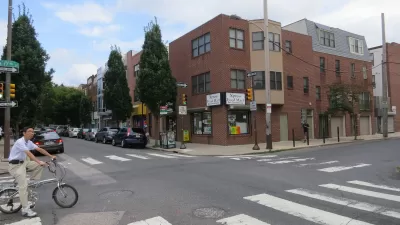A new voice in the unending chorus of complaints about Millennials, the Wall Street Journal reports that Millennials should be blamed for wanting to live in places that are popular to live in, and implies they should spend more time driving.

In a story about how some expensive cities are expensive to live in, Laura Kusisto posits, "Millennials are (partly) to blame." Why are the people who own less of the property and aren’t in positions of power to blame? Kusisto writes, "Preferences have changed among young people, many of whom want to live closer to transit, restaurants and their workplaces."
One can only wonder what alternatives the author imagines would be preferable. Should Millennials buy Kansas farmland? Should Millennials live with their parents longer? Too late: they already are. Maybe they should just learn to have fun like the generation that has all the money or eat less avocado toast.
FULL STORY: Why Millennials Are (Partly) to Blame for the Housing Shortage

Planetizen Federal Action Tracker
A weekly monitor of how Trump’s orders and actions are impacting planners and planning in America.

Congressman Proposes Bill to Rename DC Metro “Trump Train”
The Make Autorail Great Again Act would withhold federal funding to the system until the Washington Metropolitan Area Transit Authority (WMATA), rebrands as the Washington Metropolitan Authority for Greater Access (WMAGA).

The Simple Legislative Tool Transforming Vacant Downtowns
In California, Michigan and Georgia, an easy win is bringing dollars — and delight — back to city centers.

The States Losing Rural Delivery Rooms at an Alarming Pace
In some states, as few as 9% of rural hospitals still deliver babies. As a result, rising pre-term births, no adequate pre-term care and "harrowing" close calls are a growing reality.

The Small South Asian Republic Going all in on EVs
Thanks to one simple policy change less than five years ago, 65% of new cars in this Himalayan country are now electric.

DC Backpedals on Bike Lane Protection, Swaps Barriers for Paint
Citing aesthetic concerns, the city is removing the concrete barriers and flexposts that once separated Arizona Avenue cyclists from motor vehicles.
Urban Design for Planners 1: Software Tools
This six-course series explores essential urban design concepts using open source software and equips planners with the tools they need to participate fully in the urban design process.
Planning for Universal Design
Learn the tools for implementing Universal Design in planning regulations.
Smith Gee Studio
City of Charlotte
City of Camden Redevelopment Agency
City of Astoria
Transportation Research & Education Center (TREC) at Portland State University
US High Speed Rail Association
City of Camden Redevelopment Agency
Municipality of Princeton (NJ)





























